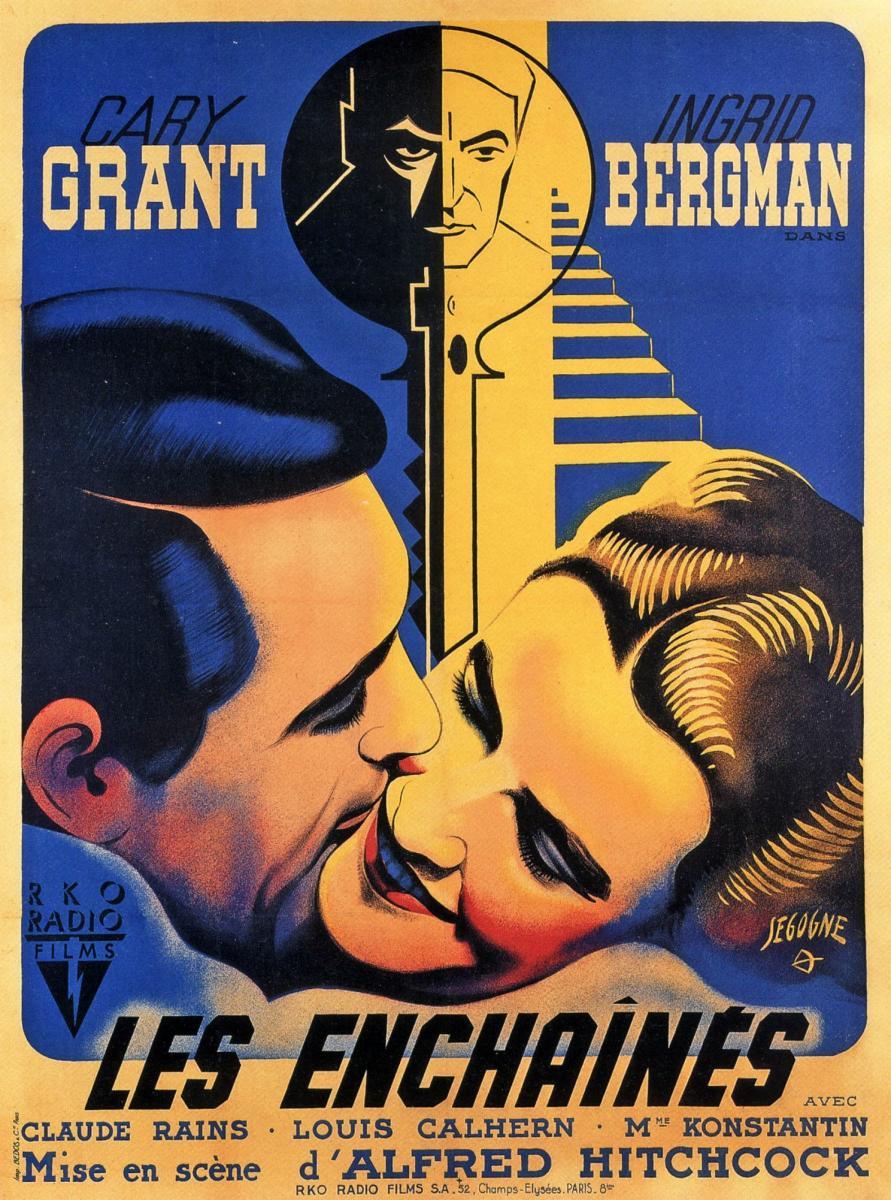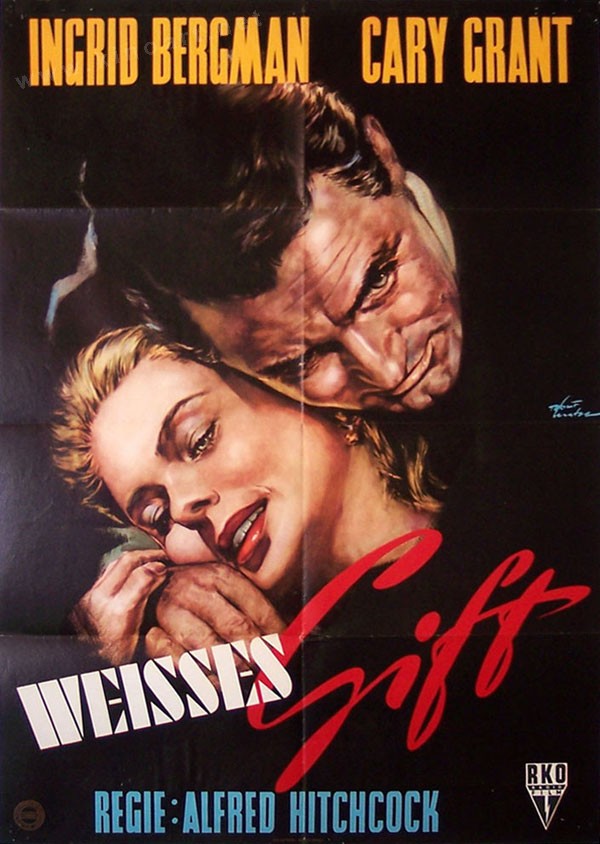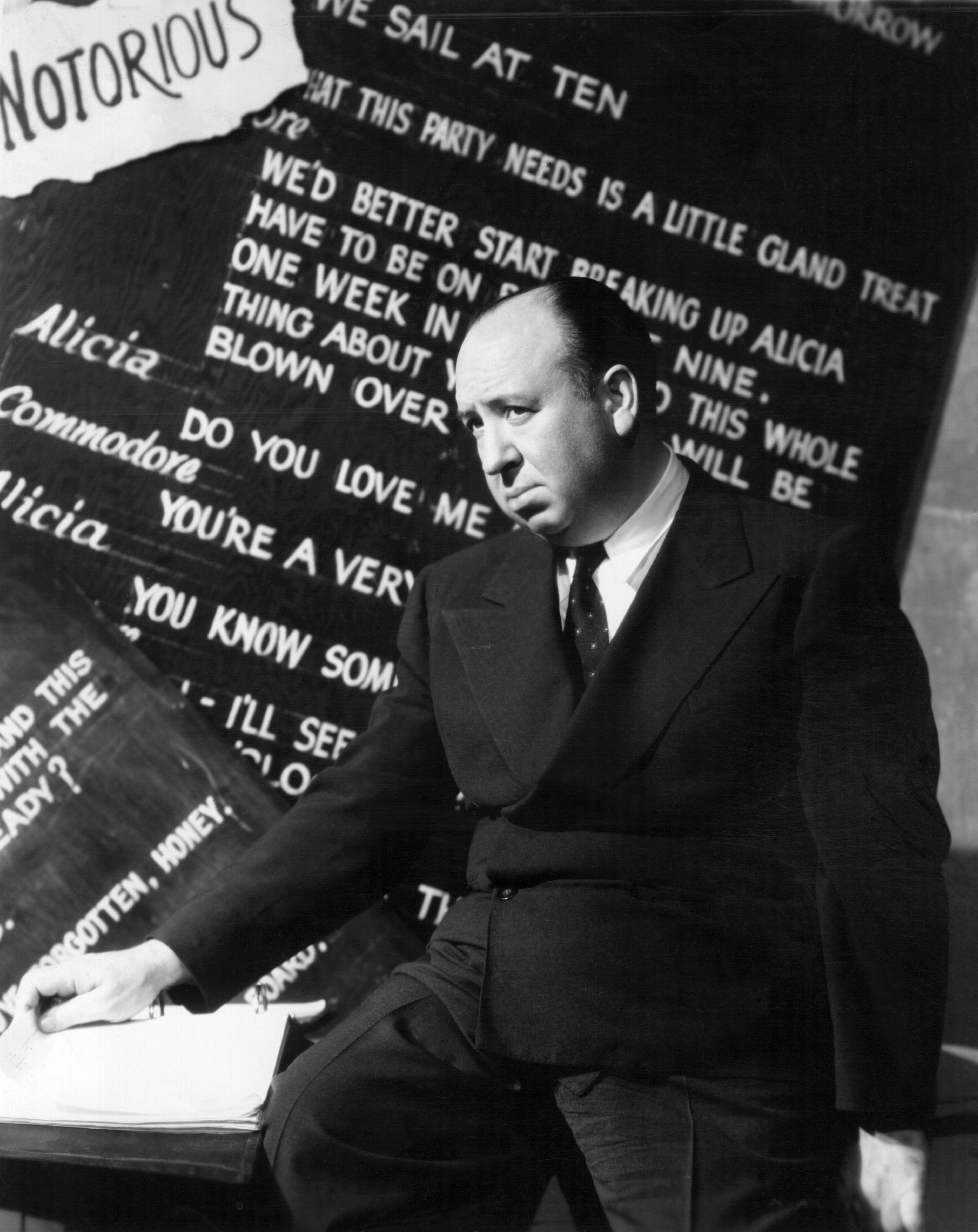- Ingrid Bergman and Cary Grant heat up the screen and fool postwar censors
- Sex, intrigue, espionage and poisoning: Master of Suspense brews a heady mix
- Political: Even at 80-odd years old, it’s still too hot to release in Germany uncut
- Hitchcock’s first of many collaborations with iconic costume designer Edith Head
- Another first: Complete history of composer Roy Webb’s vastly underrated score
- Timeless tale has spawned many stage, screen and radio remakes and homages
- Aged 40, it also inspired a hit album and single by Brit popsters Duran Duran
Note: this is part of an ongoing series of 150-odd Hitchcock articles; any dead links are to those not yet published. Subscribe to the email list to be notified when new ones appear.
Notorious: Writing on a Classic; Critics Choice; Collectors Guide, Pt 2: Home video
Contents
Production
“Among the finest Hitchcock thrillers.” – Video Movie Guide
Cary Grant is an American secret agent and Ingrid Bergman is the “notorious” woman whose love he must sacrifice in Alfred Hitchcock’s acclaimed romantic thriller. As part of her undercover work for the U.S. government in Rio, the daughter (Bergman) of a convicted Nazi traitor marries a ruthless Nazi spy (Claude Rains in an Oscar-nominated performance for Best Supporting Actor in 1946). But she soon begins a love affair with the American agent (Grant) who is her contact. Torn between passion and their patriotic cause, they decide to work together and put their feelings aside. With its suspense-packed climax, memorable love scenes and superb plot twists, Notorious is one of Hitchcock’s most popular classics. – US CBS/Fox VHS (1992)
“One of Hitchcock’s most seductive high-style thrillers.” – The New Yorker
Notorious was the last of of Alfred Hitchcock’s films to deal with anti-Nazism. The director claimed that the script’s references to uranium alarmed the FBI, which suspected Hitchcock had learned the secret of the atom bomb. But the story later turned out to be simply [self-invented] Hollywood folklore. In this riveting World War II drama, the daughter (Ingrid Bergman) of a convicted Nazi traitor is hired by an American secret agent (Cary Grant) to go undercover and find German scientists hiding in Brazil. To prove her loyalty to America. she agrees to marry her father’s former Nazi conspirator (Oscar nominee Claude Rains), even though she and the agent have fallen in love. Suspenseful and sweepingly romantic, Notorious is a vintage Hitchcock classic. – US CBS/Fox VHS (1996)
Movie of the Week: Notorious/Bergman on Broadway – Life
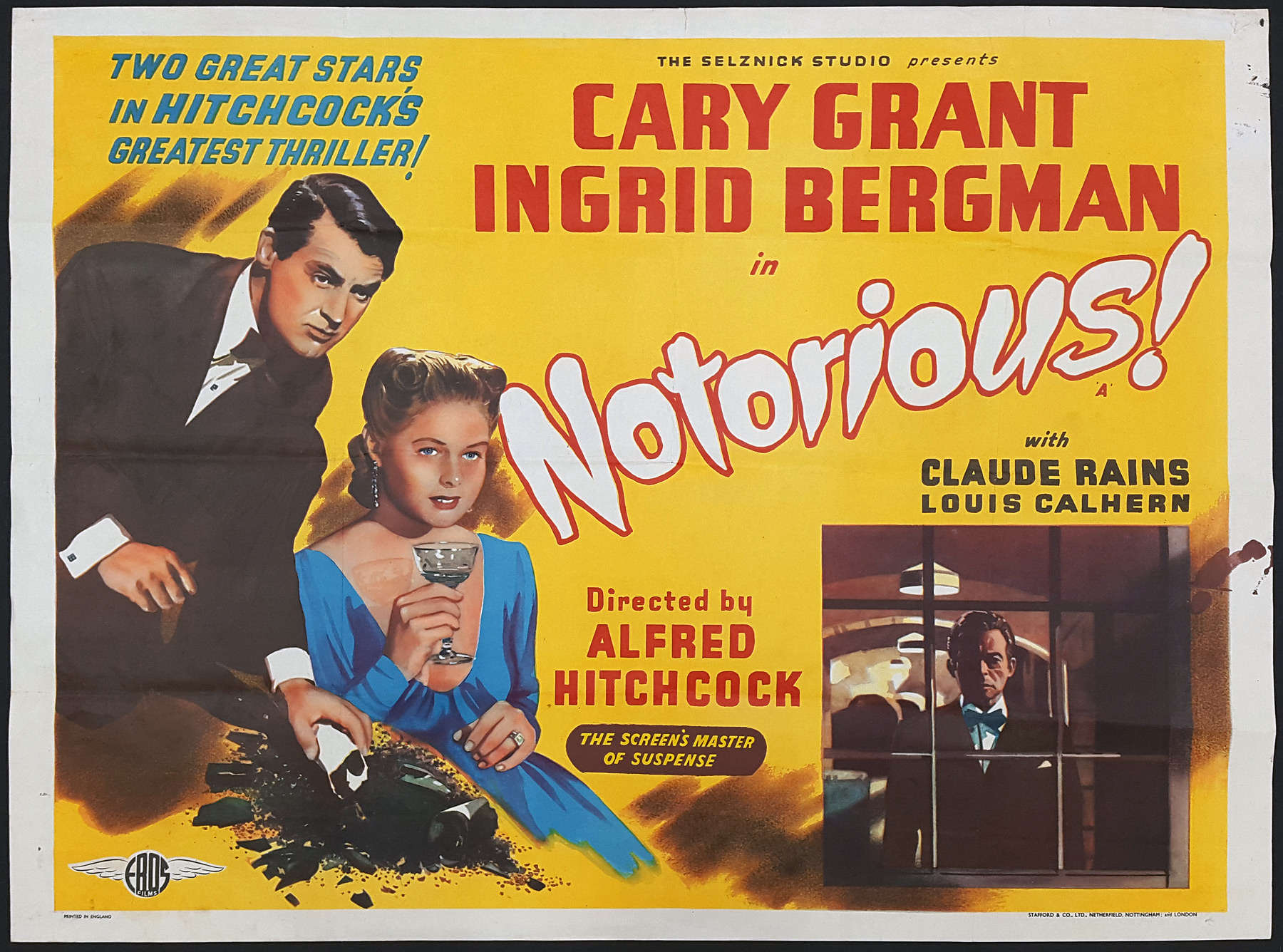
This rare UK quad poster by Stafford & Co., Nottingham, is marked ‘A’ for Adult and sold recently for £495; its original price was three shillings (UK pressbook). Quite the markup. For more info see Suspicion.
US pressbook (alt/alt) | BTS, Alamy, Bridgeman, Getty, Imago
The Notorious script wasn’t to producer David O. Selznick’s liking and he was deep in the hole with cost overruns on Duel in the Sun, so early in production he sold the entire project, including Hitch’s services, to RKO in return for a slice of its considerable profits. However, via a series of film library sales and catalogue mergers, it has since rejoined the three films Hitch actually did make under Selznick – Rebecca, Spellbound and The Paradine Case – in addition to Lifeboat.
- Hitchcock and Selznick: Their Rich and Strange Collaboration in Hollywood (1987/1999) – Leonard J. Leff | review
- Alfred Hitchcock: Notorious (2007) – Veronica Pravadelli
Notorious is nominally based on “The Song of the Dragon”, a 1921 short story by American author, playwright and screenwriter John Taintor Foote. It first appeared as a two-parter in the Saturday Evening Post before being republished two years later in an eponymous anthology (Internet Archive). Original copies are now scarce and expectedly expensive; all the more so as until recently it had strangely never been reprinted, despite being long out of copyright.
To keep both Bergman and the coffee cups in focus during the poisoning scene, giant prop cups were made, much like the giant ‘monocle’ in Easy Virtue, wooden hand in Spellbound and telephone in Dial M for Murder.
Censorship

German poster by Will Williams, translating as “White Gift”. The incongruous title and glass of milk instead of a cup of coffee more closely references Joan Fontaine’s predicament in Suspicion, also starring Cary Grant.
It’s well-known that Notorious faced several cannily circumnavigated problems from the US censors, most notably regarding Alicia’s colourful past and that kissing scene. Hitch later revealed in a politically incorrect interview how the latter had a surprisingly insalubrious inspiration but less often discussed are the issues his films ran into elsewhere. For instance, on its belated post-war German release, Notorious was retitled Weißes Gift (White Poison) then censored by cutting two chunks totalling 17 seconds from the original version and removing all mentions of uranium and Nazis from its 1951 dub (alt). Instead, the uranium became drugs and those dealing in it became non-Germans.
A more accurate 1969 dub accompanied the first TV broadcast on ZDF under its original title, albeit translated to Berüchtigt. But it still conformed to the cut version and the euphemism “German paint industry” was substituted for the name of real-life chemical company I.G. Farben (I.G. Colours). An attractive Illustrierte Film-Bühne, Nr. 1103 magazine pull-out features a detailed synopsis of the 1951 version, while these illuminating reports are all fully translatable:
- 1969 dub vs OST
- Dub comparisons
- Two dubs in comparison
- I.G. Farben cut out of Notorious
- 21.9.51: Notorious cinema release with distorted dubbing
I.G. Farben played a major part in the Nazi war effort and profited hugely as a result; among their many contributions was using slave labour to manufacture the pesticide Zyklon B for mass murder in the gas chambers of the Auschwitz-Birkenau extermination camp. After the war, the company’s directors were successfully prosecuted in the Nuremberg trials and imprisoned. Although I.G. Farben has gone through various rounds of liquidation and restructuring, it still survives via a handful of powerful companies. Which at least partly explains why the only authorised German DVD to date has the 1969 edits and (optional) dub.
Bergman und Grant – Ihre Freundin
Soundtrack
There have been no full releases of composer Roy Webb’s great score; almost certainly because, along with those for the other Hitch-Selznicks, the original masters no longer exist. However, in their stead we do have the full length music and sound effects track on Criterion’s LD, first DVD and the remastered MGM discs. Mysteriously though, in this case it’s absent from Criterion’s latest restored releases. Such blended tracks were specially produced by studios to facilitate dubbing in foreign markets. Though scored by Webb, the waltzes, Latin music and popular songs in Notorious were stock music used for many films. For instance, the music accompanying the renowned crane shot and party scene first appeared in Stage Door (1937) and Action in Arabia (1944, Spain), both also scored by Webb; then again in The Paradine Case, scored by Franz Waxman. Stage Door releases:
- US: Warner DVD (2005, R0 2016 reissue), also in 4-DVD TCM Greatest Classic Legends and 6-DVD Classic Comedies Collection | TCM
- UK: Odeon DVD (2010)
- Italy: Sony DVD (2011)
- France: Éditions Montparnasse DVD (2003)
- Spain: Vértice DVD (2013), also in 5-DVD Ginger Rogers and 8-DVD Katharine Hepburn
- Bootlegs: Australia (Payless), Italy (Dynit, Golem), Spain (Cinecom)
Apart from all that, it’s slim pickings even for any releases of Webb’s original Notorious cues. First are two digitally cleaned-up suites from his own 1942–1949 acetates but unfortunately the performers are unknown and as Webb died in 1982, I guess he ain’t tellin’. However, it’s almost certainly the RKO Studio Orchestra conducted by Constantin Bakaleinikoff, as per the finished article. Apart from those, a few other cues taken directly from the film’s soundtrack are available on various compilations.
- CNR CD The Curse of the Cat People: The Film Music of Roy Webb (1995) RKO SO cond. CB (5:03, 4:29)
- Disques Cinémusique 15-tr MP3 Best Cary Grant/Ingrid Bergman Movie Themes and Best Film-Noir Music of the 1940s Main Title (1:20)
- Pickwick CD Great Movie Soundtracks (1988) Suite (5:47)
- Museum Music CD AH: Music from His Films (1999) Alex in the Wine Cellar (2:47) bootleg
- Varèse Sarabande LP/CD–alt/MP3 Music from Four AH Films (1985) Utah Symphony Orchestra cond. Charles Ketcham (5:49)
By far the least well-known composer on this album is Roy Webb, who died in 1982 at the age of 94. He did two of Hitchcock’s films—the comedy Mr. and Mrs. Smith and Notorious. Webb spent most of his working life at RKO Radio Pictures, for whom he scored many distinguished films: among them The Last Days of Pompeii, Welles’ Journey into Fear, Lewton’s Cat People, Farewell My Lovely, The Spiral Staircase, I Remember Mama, Crossfire, The Enchanted Cottage, and many others. In certain ways his technique was untypically (for Hollywood) sophisticated: he had a special feeling for atmospheric nuance and (as we can hear in Notorious) employed mutedly dissonant harmonic color and sparely evocative texture to great effect. The Notorious Titles, however,—and how splendidly attention-getting are those discordant trumpet alarms with which they open—also betray the hand of a fine Romantic melodist.
The broad, spacious singing tune—a love-theme for American agent Devlin (Cary Grant) and his aide Alicia (Ingrid Bergman)—is put to good dramatic use in Alicia Collapses, where, in tortured chromatic guise, it portrays the very-nearly successful attempt on the part of Sebastian (Claude Rains) and his mother to poison Alicia; what the music tells us, of course, is that in her extremity of sickness and confusion her mind is full of Devlin, from whom she is estranged. Earlier there has come the most important musical sequence, the one which marks the film’s turning point. Sebastian—key-link in a chain of uranium-smuggling Nazis in South America—goes downstairs and lets himself into his wine cellar. To begin with everything seems to be in order, but then he notices the stained sink, the stained floor, and finally the bottle Devlin had substituted for the one he had broken (which contained uranium) during his search.
There is no dialogue; the drama must be enacted solely through Rains’ facial expression, his actions and the music (here the trumpet alarms of the Titles return to chilling effect). No less crucial is the music’s contribution to the following sequence, Troubled Mind. Rains walks slowly through the deserted house and up the staircase to his mother’s room. Only the music tells us what must be passing through his mind—that he is ruined, that he has betrayed his mother, his country and himself and that he will pay with his life when his fellow-Nazis-in-exile find him out. And in the film’s last shots, when Sebastian mounts the steps of his house to meet his nemesis at the hands of his ruthless compatriots, the music swings eloquently to a close—like the huge front door—with an air of black and terrible finality. – Christopher Palmer, Music from Four Hitchcock Films (1985)
- Hitchcock’s Music (2006) – Jack Sullivan | interview, podcast, video | review/#2/#3/#4
Lastly, for the sake of completeness, is Hitch fan and noise-drone/ambient musician Cory Strand’s Notorious (2014). Like most of his hundreds of hours-long soundtrack makeovers, it was released as a limited edition before being posted on Bandcamp.
Edith Head
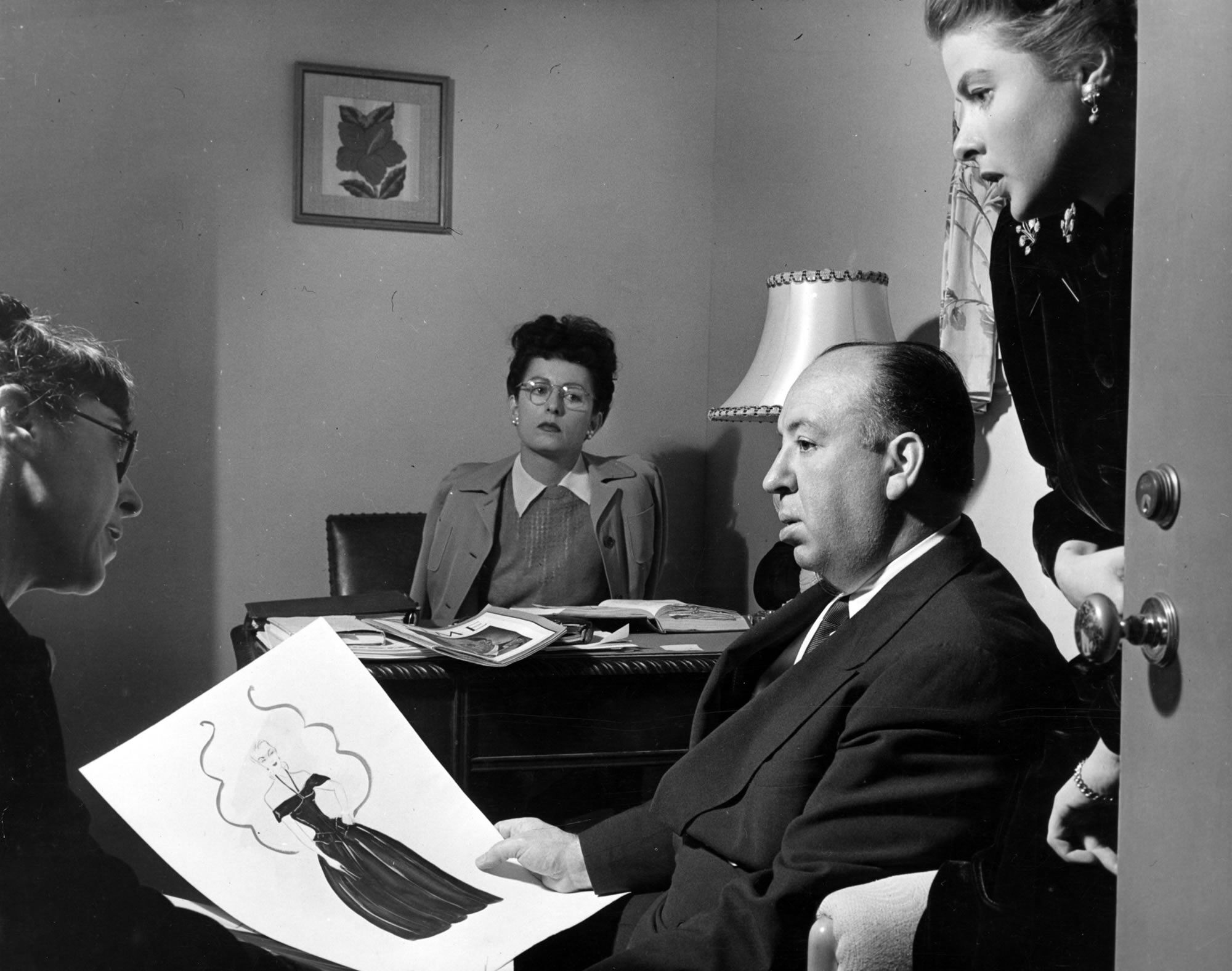
Kindred spirits: Edith Head (left) discusses dresses for Bergman (right) with Hitch. That’s probably Head’s assistant in the middle, rather than script supervisor Gana Jones or production assistant Barbara Keon; can anyone confirm?
Notorious was the first of 11 Hitchcocks that Edith Head, the eight-Academy Award-winning and 35-times-nominated costume designer worked on, although amazingly none of her Oscar wins were for his films. A woman of no mean achievement then, but still infamously prone to exaggerating her accomplishments, and claiming the work of many others as her own, much like Hitch himself. Grr. Nonetheless, her reputation remains intact and she was the subject of exhibitions in at least 2014, 2017 and 2024; in 2013 she even received the accolade of a Google Doodle on what would have been her 116th birthday.
- How to Dress for Success (1967/2009) – Edith Head and Joe Hyams | German
- Edith Head’s Hollywood (1983/2008) – Edith Head and Paddy Calistro
- EH: The Life and Times of Hollywood’s Celebrated Costume Designer (2003) – David Chierichetti
- EH: The Fifty-Year Career of Hollywood’s Greatest Costume Designer (2010) – Jay Jorgensen
There are numerous interviews and TV documentaries, many of which can be found on YouTube, while a lighthearted, eponymous profile from 1981 is on DVD, BD and streaming. Lastly, a total of five featurettes on the designer are included on releases of The Lady Eve (Criterion), The Heiress (Criterion), Sunset Boulevard and To Catch a Thief, Vertigo (from 2008 onwards) and Sweet Charity (1968).
- Edith Head (2014) – Isabella Alston and Kathryn Dixon
- Award-Winning Fashions of Edith Head: Paper Dolls (2014) – Tom Tierney
- The Costume Designer: Edith Head & Hollywood/exhibition (2017) – ed. Penelope Curtin
- Dressing Up the Stars: The Story of Edith Head (2022) – Jeanne Walker Harvey and
Remakes
The 1927 silent film Convoy, Lowell Sherman and Dorothy Mackaill, was also based on the same short story but is unfortunately lost. There’s a sole bona fide remake of the film itself, a so-so 1992 US TV movie by British TV director Colin Bucksey, which has only been released on VHS internationally including the US and UK but can be seen on YouTube. While not an official remake, it’s been widely noted that the plot for Mission: Impossible II (2000) borrows very heavily from Notorious, among others, despite screenwriter Robert Towne’s insistence it’s merely paying homage. Speaking of which, check out the 1973 “Salute to RKO” sketch in The Carol Burnett Show and this recreation of the wine cellar scene. Most recently, the film was adapted as an opera; fittingly a Swedish production as was Bergman herself, it was staged from 19.9–1.11.2015 at Göteborg Opera, débuting just a couple of weeks before her centenary.
On the radio

Joseph Cotten and Ingrid Bergman; another
There have been only two radio adaptations of the film’s original script, with both seeing the return of Ingrid Bergman. In the first she appears alongside Joseph Cotten, with whom she would soon star in Under Capricorn; and the second features John Hodiak, one of the stars of Lifeboat.
- Lux Radio Theatre, January 26, 1948 (59min, subtitled) – Radio Spirits CD/cass, 2-CD/cass
- Screen Guild Theater, January 6, 1949 (25min)
Duran Duran
This is one of three Hitch film titles borrowed by fans Duran Duran in 1986: their album Notorious and eponymous lead single; the instrumental demo “Rope” (0:00–3:32) which became track five, “Hold Me“; and track six, “Vertigo (Do the Demolition)”. All three sets of lyrics elliptically refer to the films’ plots.
- Parlophone LP/CD/MP3 Notorious Deluxe Edition (1986) – Duran Duran
Notorious: Writing on a Classic; Critics Choice; Collectors Guide, Pt 2: Home video
Related articles
This is part of a unique, in-depth series of 150-odd Hitchcock articles.

